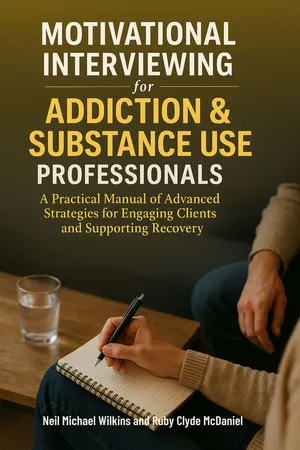
Motivational Interviewing for Addiction & Substance Use Professionals
A Practical Manual of Advanced Strategies for Engaging Clients and Supporting Recovery
- English
- ePUB (mobile friendly)
- Available on iOS & Android
Motivational Interviewing for Addiction & Substance Use Professionals
A Practical Manual of Advanced Strategies for Engaging Clients and Supporting Recovery
About this book
Motivational Interviewing for Addiction & Substance Use Professionals
A Practical Manual of Advanced Strategies for Engaging Clients and Supporting Recovery
Transform your substance use counseling practice with this comprehensive practical manual on Motivational Interviewing (MI). This essential guide walks practitioners through every step of implementing MI techniques in real-world clinical settings, moving beyond theory to provide actionable strategies for creating meaningful change.
Discover proven approaches for engaging resistant clients, navigating ambivalence, and strengthening motivation for recovery. The manual includes detailed session guides, verbatim dialogues, and over 30 ready-to-use worksheets and assessment tools that can be immediately incorporated into your practice.
This practical resource covers crucial adaptations for diverse settings including emergency departments, outpatient clinics, residential programs, and criminal justice contexts. Learn specialized techniques for working with adolescents, pregnant clients, individuals with co-occurring disorders, and culturally diverse populations.
Backed by extensive research demonstrating MI's effectiveness in substance use treatment, this manual bridges the gap between initial training and skilled implementation. Develop proficiency through structured skill-building exercises, troubleshooting guides for common challenges, and clear benchmarks for measuring progress.
Perfect for both new clinicians seeking a structured approach and experienced practitioners looking to enhance their MI skills, this manual provides the concrete tools needed to help clients make lasting changes in substance use behaviors. Transform your therapeutic effectiveness with this accessible, evidence-based guide to the art and science of motivational interviewing.
Frequently asked questions
- Essential is ideal for learners and professionals who enjoy exploring a wide range of subjects. Access the Essential Library with 800,000+ trusted titles and best-sellers across business, personal growth, and the humanities. Includes unlimited reading time and Standard Read Aloud voice.
- Complete: Perfect for advanced learners and researchers needing full, unrestricted access. Unlock 1.4M+ books across hundreds of subjects, including academic and specialized titles. The Complete Plan also includes advanced features like Premium Read Aloud and Research Assistant.
Please note we cannot support devices running on iOS 13 and Android 7 or earlier. Learn more about using the app.
Information
Table of contents
- Motivational Interviewing for Addiction & Substance Use Professionals
- Table of Contents
- Foreword
- Introduction
- Purpose and Scope of the Manual
- How to Use This Resource
- The Critical Role of Counselor-Client Relationship in Substance Use Treatment
- Chapter 1: The Spirit and Philosophy of Motivational Interviewing
- Historical Development of MI
- Core Principles
- Comparison with Other Therapeutic Approaches
- Evidence Base for MI in Substance Use Disorders
- Chapter 2: Understanding Change Processes
- Stages of Change Model
- Ambivalence as a Normal Part of the Change Process
- Resistance and Sustain Talk
- Chapter 3: Core Skills of Motivational Interviewing (OARS)
- Open-Ended Questions
- Affirmations
- Reflective Listening
- Summarizing
- Skill Integration and Practice Exercises
- Chapter 4: Engaging – Building the Therapeutic Relationship
- Creating a Safe, Non-judgmental Environment
- Building Rapport with Substance-Using Clients
- Addressing Power Dynamics and Authority Issues
- Working with Mandated Clients
- Cultural Considerations in Engagement
- Chapter 5: Focusing – Finding Direction in the Conversation
- Identifying Change Goals Collaboratively
- Agenda Mapping Techniques
- Navigating Competing Priorities
- Maintaining Direction While Following the Client
- Chapter 6: Evoking – Cultivating Change Talk
- Commitment, Activation, Taking Steps
- Strategic Techniques to Evoke Change Talk
- Responding to Sustain Talk and Resistance
- Working with Ambivalence Effectively
- Chapter 7: Planning – Supporting Commitment to Change
- Transition from Evoking to Planning
- Developing Change Plans That Work
- Strengthening Commitment Language
- Addressing Barriers to Implementation
- Supporting Client Self-Efficacy
- Chapter 8:MI in Crisis and Early Intervention
- Using MI in Emergency Settings
- Brief Interventions in Medical Settings
- Harm Reduction Approaches Within MI
- Working with Acute Intoxication and Withdrawal
- Chapter 9:MI in Various Treatment Settings
- Outpatient Counseling Adaptations
- Residential Treatment Applications
- Group Counseling Using MI Principles
- Family Sessions with MI Approach
- Chapter 10: Co-occurring Disorders and Complex Cases
- Adapting MI for Clients with Mental Health Conditions
- Trauma-Informed MI Approaches
- Working with Chronic Relapse Patterns
- Addressing Polysubstance Use
- Chapter 11: Special Populations
- Adolescents and Young Adults
- Older Adults
- Cultural Adaptations
- Gender-Specific Considerations
- LGBTQ+ Populations
- Pregnant Clients and Parents
- Chapter 12: Common Challenges and Pitfalls
- The Righting Reflex and Other Counselor Traps
- Managing Personal Reactions and Countertransference
- Ethical Considerations in MI Practice
- Maintaining Fidelity to MI While Being Flexible
- Chapter 13: Skill Development and Supervision
- Self-assessment Tools
- Recording and Reviewing Sessions
- Peer Feedback Methods
- Formal Supervision Frameworks
- Coding Systems for MI Proficiency
- Chapter 14: Integration with Other Approaches
- MI and Cognitive-Behavioral Therapy
- MI and 12-Step Facilitation
- MI and Medication-Assisted Treatment
- MI within Case Management Frameworks
- Chapter 15: Session Guides and Protocols
- Initial Assessment Session Template
- Follow-up Session Structures
- Group Session Formats
- Discharge and Continuing Care Planning
- Chapter 16: Practice Exercises and Worksheets
- For Counselor Skill Development
- For Client Use in and Between Sessions
- Assessment Tools and Feedback Instruments
- Progress Tracking Methods
- Appendices
- A: Quick Reference Guides for Different Settings
- B: Glossary of MI Terms and Concepts
- C: Recommended Resources for Further Learning
- E: Research Supporting MI in Substance Use Treatment
- References